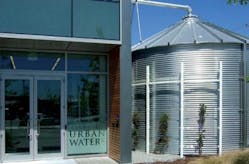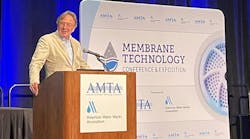A dry start to the year has forced water utilities in the UK to seek drought permits and introduce hosepipe bans. People should be more frugal with this resource and wake up to the benefits of recycled water, as demonstrated at the Singapore International Water Week.
"It's raining, it's pouring; the old man is snoring,", or so goes an old nursery rhyme. But currently, this scenario couldn't be further from the truth here in the UK (the weather, not sleeping old men). With the country experiencing one of the driest first six months of the year in the last century, water companies are being forced to consider hose pipe bans to encourage a more sustainable use of water.
The first half of the year has been so dry that some parts of the country have been put on drought alert. Figures from the Met Office show that from 1 January to 28 June the UK had 356.8 mm of rain - the driest six months since 1929, when 275.7 mm was recorded.
Such conditions have been caused by a lack of Atlantic weather systems, which usually cross the UK bringing bands of rain, especially to western regions. A knock-on effect has been a severe decrease in the water level of reservoirs. Instead of the usual 80% full they are said to be approximately 68.2% full in North and West Cumbria; 61.4% at Haweswater and Thirlmere and 65.4% in the Pennines.
As a result, certain water utilities are going to the extremes of seeking drought permits in order to extract water below the recommended overflow levels. United Utilities, as can be seen on page eight, hopes to take water from a lake down to 1.70m below the required level. Under normal circumstances they cannot exceed 1.35m. A legal process will now follow before the environmental regulator will make a decision.
Furthermore, at the time of going to print, the utility announced it would be imposing a hosepipe ban in the North West - the first for 14 years. Such bans act as a strong deterrent against wasteful behaviour such as washing cars in the height of summer. Given the dry conditions that people should be aware of, cutting down on these profligate habits should go without saying; ban or no ban.
Elsewhere in the country, new infrastructure is coming online to help deal with water shortages in the future. The start of June saw Thames Water open the UK mainland's first major desalination facility in the East End of London, which could supply up to 150 million litres of water a day, if required (page 22). The supply would be used in the event of "two dry winters in a row".
Using a four-stage reverse osmosis process, the project has undergone a lengthy political battle to get to this stage and even now, certain industry experts remain sceptical over the choice of desalination compared to a wastewater reclamation facility.
"It was probable that Thames Water didn't go down the wastewater reuse route because when they were making these decisions the concept of using wastewater was not widely accepted," said Dr Graeme Pearce, principle from Membrane Consultancy Associates, before adding: "Now a number of years have past it has been accepted in various parts of the world and that's what we should do in the future."
One part of the world that is exemplary when it comes to wastewater reuse is Singapore. Having just returned from the International Water Week I was impressed to see Singapore not resting on its laurels, but in fact setting out even more challenging targets for the next 50 years. As you will from the analysis on page 13, PUB - Singapore's national water agency - aims to source 50% of its water supply from NEWater (recycled water) by 2060.
To convince people of the quality of NEWater and the taboos that have been broken down in it's production, 17 million bottles have been given out since its introduction. It was also clear the confidence people have in this product outside of Singapore; I noticed several delegates happily helping themselves to sample bottles during the course of the international water week.
The water reuse debate will inevitably continue to rumble on and Thames Water cannot be faulted for their decision on desalination - the UK public would not have been ready to take the 'leap of faith' to use recycled water back in 2002, when the project was being discussed.
Even now, eight years later, convincing the public on the merits of reclaimed water will remain one of the biggest communication challenges this industry faces in the future.
So, let's hope the "old man" mentioned in the earlier nursery rhyme, and in fact the rest of the nation, are not snoring, but waking up to fact that recycled water could play a big part of their future water supply, especially if the dry conditions continue.
Enjoy the issue.
More Water & WasteWater International Current Issue Articles
More Water & WasteWater International Archives Issue Articles




